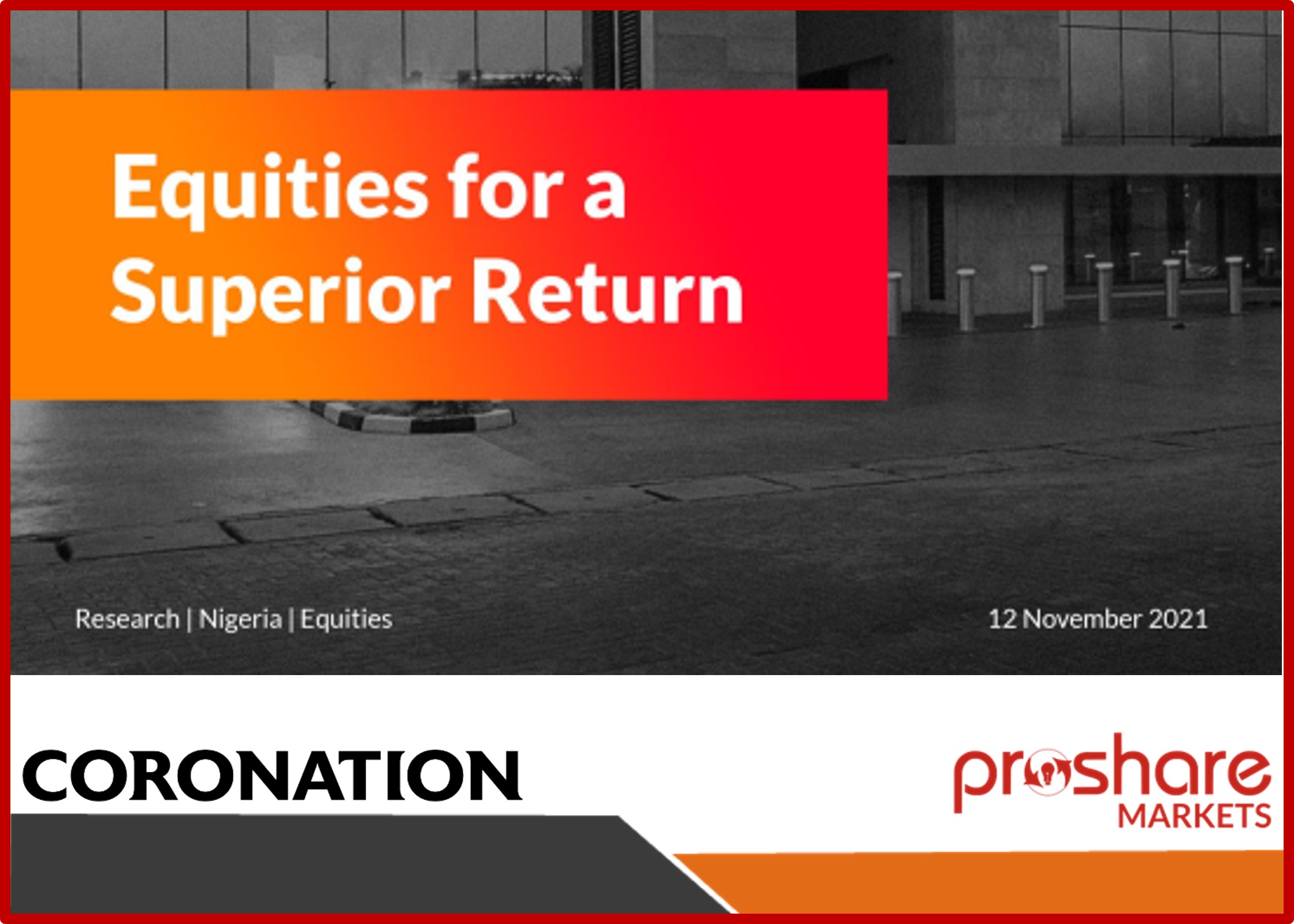Dividends have made an important contribution to total equity returns in 2022. What is the outlook going into 2023? It helps that the NGX All-Share Index is up this year, but not so much as to reduce the significance of dividends. As is proving to be the case in 2022, we think gross dividends could add some five percentage points to equity performance in 2023
Dividends for Equity Returns in 2023
Last week, we wrote how receiving dividends and reinvesting them has added materially to the performance of Nigerian equity portfolios this year. This effect only works because: (a) dividend payments are reasonably generous; and (b) the market overall has been trending up this year (otherwise it would have been better to have held onto dividends in cash). We wrote that the excess performance of the market's total return over its share price return, year-to-date, is now close to 5.0 percentage points (500bps), which is well worth having.
An obvious problem with this measurement is that it uses the rear-view mirror; we are looking backwards. What could investors have done about dividends at the beginning of this year and what can they do about them in 2023? There are two points to be made. The first is that companies usually pride themselves on their dividend-paying record (partly because dividends provide significant income to core shareholders), so dividends are reasonably predictable and tend not be cut if at all possible. The second is that dividend yields vary enormously between stocks, though the dividend yield itself does not drive share price performance (for example, banks have good dividend yields but the banking sub-index has performed poorly relative to the broad index of Nigerian stocks year-to-date).
In the table we present the top-20 stocks of the NGX All-Share Index, sorted by index weight, which together comprise 92.03% of the entire market. We have taken their total gross dividends per share (DPS) paid this year and calculated gross yields. The first gross yield is given for the price of each stock at the beginning of the year in order to give an idea of what was in prospect at that time. The second is given for the average price of each stock, year-to-date. For the 20 stocks at the beginning of the year the weighted average gross dividend yield (weighted for index weight) has been 5.86%. Using average year-to-date prices, the weighted average gross dividend yield has been slightly less, at 5.43%.
Note that we use the total gross dividends paid during 2022 rather then breaking these up into full-year, interim and other dividends. Most companies paid a full-year dividend during the first half of the year; some paid a full-year and an interim divided; one (Okomu Oil) paid three; one (Seplat) paid four. Another important point is that most investors (corporates and individuals) are liable for withholding tax on dividends at 10.00%, so the gross dividend yields need to be adjusted downwards accordingly.
What does this tell us about 2023? Some companies had bumper profits during 2022, notably Okomu Oil (due to palm oil prices) and Seplat (due to crude oil prices) and paid out accordingly. As both palm oil and crude oil prices have fallen, one might question whether their payouts will be maintained next year. The majority of dividend payers, we believe, will likely attempt to maintain or increase dividends next year. So, it makes sense to think of a weighted average gross dividend yield of approximately 5.00% (unless prices rally sharply between now and the end of the year) as we go into 2023.
FX
Last week, the exchange rate at the Investors and Exporters Window (I&E Window) gained 0.22% w/w to close at N445.33/US$1. Elsewhere, the foreign exchange (FX) reserves of the Central Bank of Nigeria (CBN) decreased by 0.18% to US$37.10bn, a 13- week low, as the CBN continues to intervene in the various FX windows.
The FX reserve position remains close to its historic high, and we doubt that the CBN wishes to see the exchange rate slip over the coming months Therefore, we believe that the current I&E Window rate, or something very close to it, can be maintained for at least several months.
Bonds & T-bills
Last week, trading in the Federal Government of Nigeria (FGN) bond secondary market was bullish as the average benchmark yield for bonds fell by 10bps to close at 14.28%. Across the curve, the yields on the 3-year (-22bps to 14.08%) bond declined while the yield on 10-year (+8bps to 14.62%) bond expanded. The yield on the 7-year bond remained unchanged at 14.45%. Our view remains that the combination of thin system liquidity and elevated Federal Government domestic borrowing will continue to drive yields upwards overthe coming months.
Activity in the Treasury Bill (T-Bill) secondary market was bearish as the average yield for T-bills rose by 31bps to 10.99%. Conversely, the yield on the 328-day T-bill fell by 5bps to close at 15.36%. Elsewhere, the average yield for secondary market OMO bills fell by 2bps to 10.13%, while the yield on the 151-day OMO bill fell by 3bps to 10.89%
Oil
Last week, the price of Brent rebounded, ending three consecutive weekly losses. Brent closed up 2.3 to settle at US$85.57/bbl. Consequently, Brent is now up 10.02% year-todate and has traded at an average of US$100.53/bbl, 41.82% higher than the average of US$70.89/bbl in 2021.
Oil prices were aided by rumors circulating of China’s easing of lockdown restrictions after bouts of protests and industrial action. Elsewhere, the Organization of the Petroleum Exporting Countries and allies (OPEC+) agreed to maintain the plan to cut output by 2.0mbpd from November in order to lessen the impact of the EU import ban and the Group of Seven (G7) US$60/bbl price cap on Russian oil. With Russia threatening to cut supply to any country adhering to the price cap, oil prices rallied.
We maintain that prices are likely to remain well above the US$73.00/bbl set in Nigeria’s government budget.
Equities
Last week, the NGX All-Share Index gained 1.26%, the third consecutive weekly gain, to settle at 48,154.65 points, the highest point since 5 October. Consequently, its year-todate return rose to 12.73%. PZ Cussons Nigeria (+14.74%), Ardova (+9.71%) and Unilever Nigeria (+7.27%) closed positive while Nigerian Breweries (-8.07%), Honeywell Flour Mills (-7.46%) and Geregu Power (-5.68%) closed negative. Performances across the NGX sub-indices were broadly positive as the NGX Pension (+1.78%) led the gainers, followed by the NGX-30 (+1.28%), NGX Banking (+1.23%), NGX Insurance (+1.11%) and NGX Oil and Gas (+0.44%) while the NGX Industrial Goods (-1.20%) and the NGX Consumer Goods (-0.61%) indices closed lower.
Model Equity Portfolio
Last week the Model Equity Portfolio rose by 1.31% compared with a rise in the NGX All-Share Index of 1.26%, outperforming it by 5bps. It has gained 18.11% year-to-date compared with a gain in the NGX-ASI of 12.73%, outperforming it by 538bps. As we forewarned last week, we began to increase our notional positions in our six bank stocks with a view to making an indexneutral total position in banks overall (which would be close to 12.00% in total as opposed to the 8.66% we have currently). We will continue to make efforts in this direction this week.
Also as we forewarned earlier, last week we increased our notional positions in Guinness Nigeria, Nigerian Breweries and Flour Mills of Nigeria towards their index weights (which are not very large) and will continue to do so this week. We remain content to be underweight in Nestle Nigeria, Seplat, Okomu Oil and Presco for now. We plan no further changes this week.
 Lagos, NG • GMT +1
Lagos, NG • GMT +1











 1537 views
1537 views

















 Sponsored Ad
Sponsored Ad
 Advertise with Us
Advertise with Us









